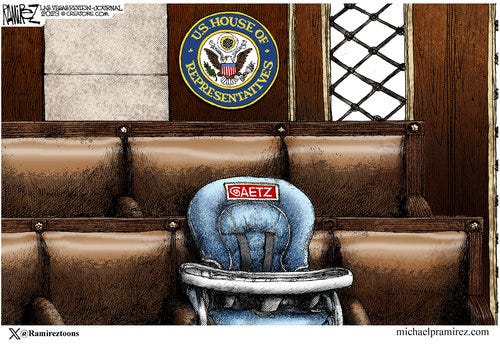Let Patrick McHenry Run the House for Now
The Republicans need time to sort out the mess caused by Matt Gaetz and his merry band of misfits.
Yesterday, I suggested that Steve Scalise did not have to rush to the Floor for a Speaker election.
Well, I guess he agreed, though not how I had intended. My point was that since there is a Speaker Pro Tempore with more power than most people seem to realize, he could take his time to win over the dissidents. Steve Scalise had too much self-respect to grovel to the crazies.
For the Republican Conference, the best word in the 118th Congress remains snafu (if you don’t know what that means, look it up). Or, more accurately still, “We have met the enemy, and he is us.” Since eight Republicans and all of the Democrats made Matt Gaetz the head clown of the Keystone Kops, not much has gone right for the GOP.
However, the point about Republicans still having a Speaker Pro Tempore in Patrick Henry remains. I wrote:
The original thinking on this position was that whoever held it was a glorified Clerk of the House whose only job was supervising the next Speaker’s election. But the reality is far different.
The current position of Speaker Pro Tempore (roughly translated as “for the time being”) was created in 2001 following the 9/11 terrorist attack to provide for the continuity of government. The idea is that even if some future terrorist made a catastrophic attack on Congress, the legislative branch of government would seamlessly continue to act. This implies that the legislative intent was to create a temporary Speakership with the same powers as an elected Speaker until a new Speaker could be elected.
Patrick McHenry became the first Speaker Pro-Tempore under the law since the outgoing Speaker, Kevin McCarthy, chose him when making a secret list that the Clerk of the House kept. The position is entirely without precedent, so much so that everything McHenry does sets a new precedent for future Speaker Pro Tempore. The dilemma for Democrats is that they have no way of stopping McHenry from assuming most, if not all, of the powers of an elected Speaker. The only way to limit the powers of the Speaker Pro Tempore, it would appear, would be to pass a resolution explicitly defining his powers.
To put that another way, the Speaker Pro Tempore has, by default, all of the powers of an elected Speaker, so long as a majority of the Congress does not proactively stop him from exercising those powers. So, if Patrick McHenry wanted to bring up legislation to provide military aid to Israel and Ukraine, there would be no way to stop him under the Rules of the House – absent a successful resolution. Granted, McHenry would still need to go through normal legislative processes, just like any elected Speaker would.
There is a lot of talk about giving McHenry more power, but my point is that he does not need a new resolution to act as Speaker unless there is a serious movement to limit his power made by the Democrats. But even that is an uncertain process because the only way they could curb his power would be a resolution that defines the power of the Speaker Pro Tempore, but that is not a point of privilege and would, so long as the Republicans oppose it, die a natural death in the Rules Committee.

Speaker Pro Tempore McHenry has all the powers of an elected Speaker by default. There is no way to prevent him from using those powers. One can see a Democrat challenging the power of the Speaker Pro Tempore, but it is likely out of order because it is challenging the Rules of the House. It just so happens that the Rules of the House are vague on the powers of a Speaker Pro Tempore. What matters most here are the precedents of the House – but there are no precedents for this position since Congress updated it in 2002.
Here is the rule that allows for a Speaker Pro Tempore:
Section 8(b)(3)(A) of Rule I states: “In the case of a vacancy in the Office of Speaker, the next Member on the list described in subdivision (B) shall act as Speaker pro tempore until the election of a Speaker or a Speaker pro tempore. Pending such election, the Member acting as Speaker pro tempore may exercise such authorities of the Office of the Speaker as may be necessary and appropriate to that end.”
The rule states that: “pending such election (the election of a Speaker or a Speaker Pro Tempore), the Member acting as Speaker pro tempore may exercise such authorities of the Office of the Speaker as may be necessary and appropriate to that end.” Indeed, the entire purpose of the Speaker pro tempore is to allow the House to function in the temporary or permanent absence of an elected Speaker.
Those who favor a narrow interpretation claim that “that end” is exclusively the election of a new Speaker or the election of a Speaker pro tempore. But those who see a broader interpretation look at the plain language that says he “may exercise such authorities of the Office of the Speaker as may be necessary and appropriate.”
The only fundamental limitation in law seems to be that under the Presidential Succession Act, the Speaker pro tempore would not be included in the presidential succession line.
Once in place, and until a new Speaker can be elected, there is no practical limit on the ability of the Speaker pro tempore to act as an elected Speaker, mainly because there is no way other than passing a resolution defining the powers of the position to stop him from serving as an elected Speaker.
There are some additional twists on this. The House could elect a Speaker Pro Tempore and replace the temporary Speaker Pro Tempore. It seems odd to do that rather than elect an actual Speaker, but it has a certain logic. If, as is apparently the case, the majority party is having difficulty selecting a candidate who can win the Speakership, they could elect a caretaker until they can elect a Speaker. But there seems to be no inherent advantage to that since both the temporary and elected Speaker pro tempore have the same powers under the Rules of the House. The only reason to do it would be if Republicans wanted someone other than McHenry to manage the House until they can elect a Speaker permanens. (I just made that title up; permanens is Latin for permanent.)
Another threat would be that it would appear the Motion to Vacate could be used against a Speaker pro tempore. This would be odd because the House would need a new unelected Speaker pro tempore.
Patrick McHenry is Speaker Pro Tempore because after Kevin McCarthy was elected Speaker, he provided a list to the Clerk of the House of Members in the order of preference that would become Speaker Pro Tempore if a vacancy occurred. Section 8(b)(3)(B) of Rule I states:
As soon as practicable after the election of the Speaker and whenever appropriate thereafter, the Speaker shall deliver to the Clerk, a list of Members in the order in which they shall act as Speaker pro tempore under Subdivision (A).
It does not say how many Members are on that list submitted by the Speaker; right now, only Kevin McCarthy and the Clerk of the House know for sure. But a Speaker pro tempore does not appear to submit a similar list since he is not elected. So, if the House makes a Motion to Vacate the Speaker pro tempore, who becomes the new Speaker pro tempore? Is it the next person on the list provided by the last elected Speaker, Kevin McCarthy?
For Republicans, though, keeping Patrick McHenry as the Speaker Pro Tempore is the best they can hope for until they nominate a Speaker who can win a majority of votes on the House Floor. All they need to do is defend the power of the Speaker Pro Tempore by preventing anyone from offering language to reduce his role.
As I mentioned yesterday, the country has serious needs that Congress must attend to, and it would be better for McHenry to do the hard work of keeping the government open and passing military assistance for our allies and allow a newly elected Speaker to avoid a Motion to Vacate his first month in office.
This is why there is some wisdom in letting McHenry exercise the powers of the Speaker for a while. In the immediate future, there is the problem of the current CR expiring. McHenry could allow a vote to keep the government open until December or January with the hope that Congress could complete work on all 12 appropriation bills. That won’t be easy, but it would show that the Republican leadership was trying hard to keep that commitment.
The other urgent issue is military assistance to our allies. Congress should bring up one bill for Israel, Ukraine, Taiwan, the southern US border, and other emergencies. Each aid package should have its own title. Then, the Rules Committee could craft a rule that allows an up or down vote on each title. So, there would be a separate vote on Israel, and another on Ukraine, and so on. This way, every Member of Congress would have a say on these critical issues. Undoubtedly, the majority for boosting security will differ from the majority on continuing aid to Ukraine. Aid to Israel and Taiwan will probably have large bipartisan majorities.
Until the Republican Conference can get out of its own way and elect a permanent Speaker, keeping Patrick McHenry right where he is and protecting his powers is the best option. It makes no sense for the Republicans to send a new candidate to the Floor without the certainty they can win 217 Republican votes. How many times will you hit your thumb with a hammer before you devise a better way to accomplish the job?
And it would be insanity if the Republicans did not change the rule that allows the Motion to Vacate to be introduced by one person who then leverages the Democrats to remove an elected Speaker supported by 96% of the Republican Conference. One person caused this entire mess. Don’t let the next “Matt Gaetz wannabe” decide they will raise money and get nightly interviews on Newsmax with the help of the Democrats and at the expense of their Republican colleagues. At the very least, there needs to be a legislative death penalty in the Conference rules to expel anyone who tries to do this again.





This was so insightful. Great read!